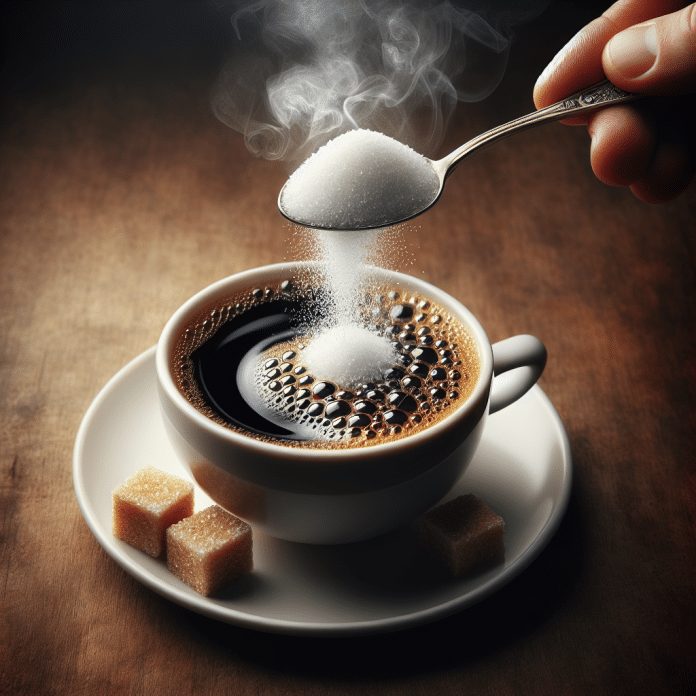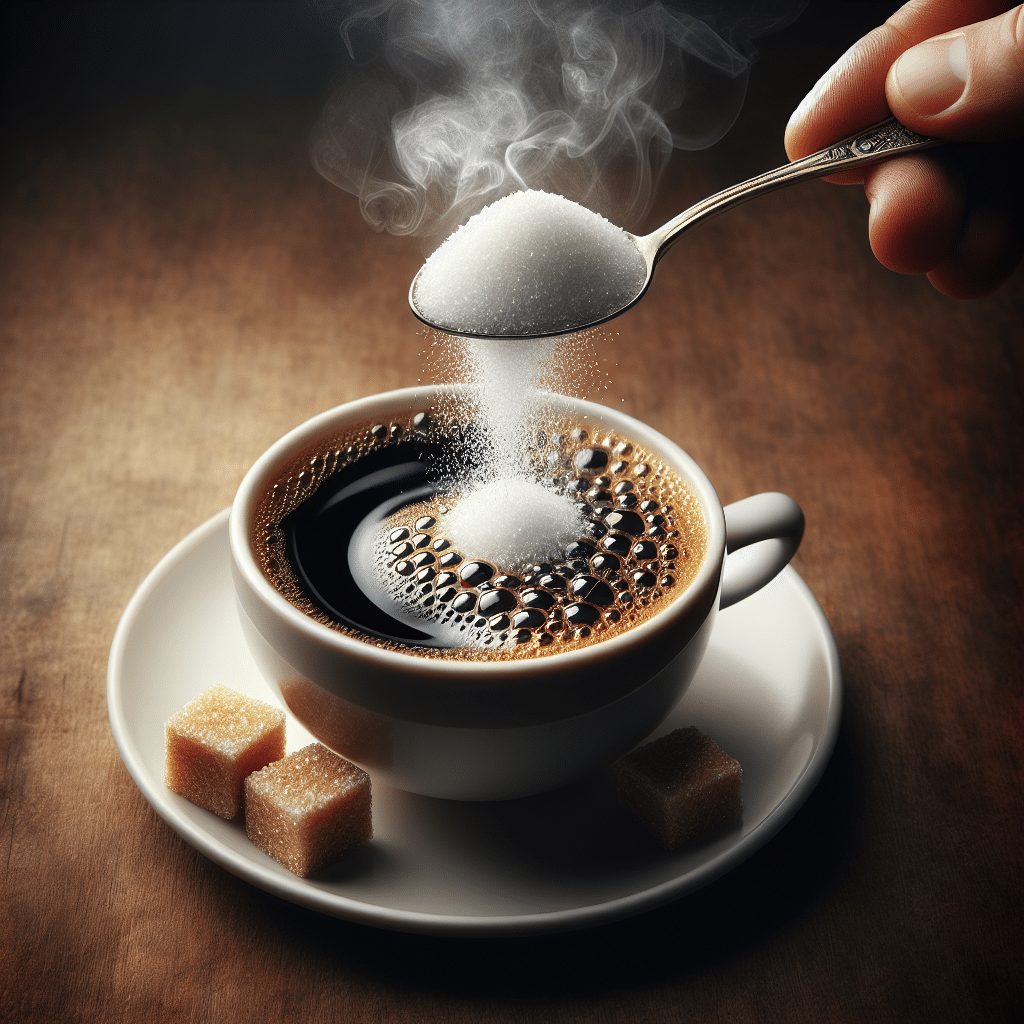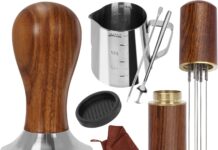Ah, the timeless combination of sugar and coffee, a match made in morning heaven. In this article, we will take a delightful journey into the world of sugar in coffee, exploring its history, its role as a beloved sweetener, and its ability to transform a simple cup of joe into a delectable treat for the taste buds. Join us as we unravel the sweetness behind this classic duo, and discover just why sugar in coffee has stood the test of time. Prepare your taste buds for a treat, my friends!
What is Sugar?
Sugar is a crystalline substance that is commonly used as a sweetener in various food and beverage products. It is derived from sugarcane or sugar beet plants and undergoes a refining process to produce the white granulated sugar we are familiar with.
Types of sugar
There are several types of sugar available in the market. The most commonly used type is granulated sugar, which is the white sugar found in most households. Other types include powdered sugar, which is ground into a fine powder and often used for dusting desserts, and brown sugar, which contains molasses and has a slightly caramelized flavor. Additionally, there are specialty sugars like turbinado sugar and demerara sugar, which have larger crystals and are often used in baking or for added texture in beverages.
Properties of sugar
Sugar has several important properties that make it desirable for use as a sweetener. Firstly, it has a high solubility in water, which means that it dissolves easily when added to hot or cold liquids like coffee. This allows for even distribution of sweetness throughout the drink. Sugar also has a high melting point, which means that it can be used in hot drinks without immediately dissolving or altering the texture. Furthermore, sugar has the ability to enhance flavors and add a pleasant mouthfeel to beverages, which makes it a versatile ingredient in the culinary world.
The Role of Sugar in Coffee
Enhances flavor
One of the key roles of sugar in coffee is enhancing its flavor. The natural sweetness of sugar can help balance out any bitterness or acidity in the coffee. By adding a small amount of sugar, you can bring out the nuanced flavors of different coffee beans, allowing you to fully appreciate the intricate tastes that coffee has to offer.
Balances acidity
Coffee can sometimes have a certain level of acidity that may not be to everyone’s liking. Sugar can act as a counterbalance to this acidity, making the coffee taste smoother and more pleasant. By adding a spoonful of sugar, you can create a better balance between the natural acidity of the coffee and the sweetness of the sugar, resulting in a more enjoyable cup of joe.
Adds sweetness
One of the most obvious roles of sugar in coffee is to add sweetness. Sugar can provide a pleasant burst of sweetness that can transform a bitter or bland cup of coffee into a delightful treat. Whether you prefer a subtle hint of sweetness or a more pronounced sugary flavor, sugar allows you to customize your coffee to your own taste preferences.
Experimenting with Sugar
Different amounts of sugar
One way to experiment with sugar in coffee is by varying the amount you add. You can start with a small amount, such as half a teaspoon, and gradually increase it until you find the perfect level of sweetness for your taste buds. Some people prefer their coffee to be barely sweetened, while others enjoy a more sugary flavor. By adjusting the amount of sugar, you can tailor your coffee experience to suit your individual preferences.
Different types of sugar
Another way to experiment with sugar in coffee is by using different types of sugar. As mentioned earlier, there are various types of sugar available, each with its own unique flavor profile. You can try using brown sugar for a caramel-like sweetness, powdered sugar for a smoother texture, or specialty sugars for added complexity. This experimentation can open up a whole new world of flavors and take your coffee experience to the next level.
Health Considerations
Caloric content
While sugar can enhance the taste of coffee, it is important to be mindful of its caloric content. Sugar is a source of empty calories, meaning that it provides energy but lacks nutritional value. A teaspoon of sugar contains approximately 16 calories, and these calories can add up quickly if you consume multiple cups of sweetened coffee throughout the day. If you are watching your calorie intake, it may be wise to limit the amount of sugar you add to your coffee or explore alternative sweeteners.
Effects of excessive sugar consumption
Consuming excessive amounts of sugar on a regular basis can have negative effects on your health. It is widely known that high sugar intake is linked to weight gain, dental cavities, and an increased risk of chronic diseases such as type 2 diabetes and heart disease. While enjoying a sweetened cup of coffee is not inherently harmful, it is important to maintain a balanced and mindful approach to sugar consumption to safeguard your overall well-being.
Alternatives to Sugar
Artificial sweeteners
For those looking to reduce their sugar intake, artificial sweeteners are a popular alternative. These sweeteners are synthetic compounds that mimic the taste of sugar without the added calories. Common artificial sweeteners include aspartame, sucralose, and saccharin. Artificial sweeteners can provide a similar level of sweetness to sugar, but it is worth noting that some people may experience a slight aftertaste or find them less satisfying than natural sweeteners.
Natural sweeteners
If you prefer a more natural alternative to sugar, there are a variety of options to choose from. Stevia, a plant-based sweetener, has gained popularity for its zero-calorie nature and intense sweetness. Other natural sweeteners like honey, maple syrup, and agave nectar can also be used to sweeten coffee. These alternatives offer different flavor profiles and may provide additional health benefits due to their natural properties. However, it is important to note that natural sweeteners still contain calories and should be consumed in moderation.
Sugar and Coffee Culture
Historical significance
The use of sugar in coffee dates back centuries and has played a significant role in coffee culture around the world. In the 15th century, sugar was a luxury item and its addition to coffee represented wealth and sophistication. As coffee became more accessible, sugar became a common accompaniment, especially in Europe and the Americas. Today, the practice of adding sugar to coffee is deeply ingrained in many cultures, reflecting the historical importance of this classic sweetener.
Cultural preferences
The amount and type of sugar used in coffee can vary widely across different cultures. In some regions, such as the Middle East, it is common to brew coffee with sugar already incorporated into the brewing process. In other cultures, like Italy, espresso is traditionally served without sugar, allowing individuals to customize their coffee to their liking. Cultural preferences also influence the degree of sweetness desired, with some countries favoring a more pronounced sweetness, while others prefer a more subtle touch. The diversity in sugar usage in coffee further illustrates its significant role in cultural traditions and individual preferences.
Tips for Using Sugar in Coffee
Choosing the right amount
When it comes to using sugar in coffee, the right amount largely depends on personal preference. Start by adding a small amount and gradually increase until you find your desired level of sweetness. Remember that coffee flavors can vary, so what works for one blend may not work for another. Taking the time to adjust the sugar to your taste ensures that you can enjoy your coffee exactly the way you like it.
Stirring techniques
To effectively incorporate sugar into coffee, it is important to stir well. This ensures that the sugar dissolves evenly, resulting in a consistent sweetness throughout the beverage. Use a spoon or stir stick to gently swirl the coffee, making sure to reach the bottom of the cup. This simple technique prevents the sugar from settling at the bottom, ensuring a well-balanced and satisfying cup of coffee.
Combining with other ingredients
Sugar can be combined with other ingredients to create unique flavor profiles in coffee. For example, you can experiment with adding a dash of cinnamon, a sprinkle of cocoa powder, or a touch of vanilla extract to enhance the overall taste. These additions can complement the sweetness of sugar and provide a delightful twist to your regular cup of coffee. Be adventurous and feel free to explore different combinations to elevate your coffee-drinking experience.
Sugar in Coffee Recipes
Classic sweetened coffee recipe
To make a classic sweetened coffee, start by brewing your favorite coffee using your preferred method. Once brewed, add sugar to taste, stirring well to ensure it dissolves completely. You can start with a teaspoon of sugar and adjust to your liking. Finally, you can personalize your sweetened coffee by adding a splash of milk or a dollop of whipped cream for added richness. Enjoy this timeless combination that satisfies both the coffee lover and the sweet tooth.
Specialty sweetened coffee recipes
If you’re feeling adventurous, there are a plethora of specialty sweetened coffee recipes to explore. From indulgent mochas to flavored lattes, the possibilities are endless. For a chocolatey treat, try a homemade mocha by adding cocoa powder, sugar, and a dash of vanilla to your brewed coffee. If you’re in the mood for something more exotic, experiment with spices like cinnamon, cardamom, or nutmeg to create a spiced latte experience. These specialty sweetened coffee recipes allow you to unleash your creativity and create unique flavor combinations that will satisfy your cravings.
Coffee Industry Perspectives
Sugar’s role in coffee sales
Sugar plays a significant role in the coffee industry, especially in the realm of sales. Many coffee shops offer a variety of sweetened coffee options to cater to different taste preferences. The availability of sweetened coffee beverages, such as flavored lattes and frappuccinos, has contributed to the growth of the specialty coffee market. Sugar acts as a key ingredient in creating these popular drinks, attracting a wide range of consumers and boosting overall coffee sales.
Coffee industry trends
As the coffee industry evolves, there is a growing trend towards healthier alternatives and reduced sugar options. With more consumers becoming health-conscious, there is a demand for alternatives to traditional sweetened coffee. Coffee shops and manufacturers are responding to this trend by offering sugar-free or low-sugar options, using natural sweeteners or artificial sweeteners to create beverages that satisfy the craving for sweetness without the excessive calories. As the industry continues to adapt, it is clear that sugar will always have a place in coffee culture, but the desire for healthier choices is shaping the future of sweetened coffee.
Conclusion
Sugar in coffee has a long-standing history and plays a crucial role in enhancing the flavor, balancing acidity, and adding sweetness to our beloved beverage. Whether you prefer a subtle touch of sweetness or a more pronounced sugary flavor, sugar allows you to customize your coffee experience. While it is important to be mindful of the caloric content and effects of excessive sugar consumption, there are alternative sweeteners available for those looking to reduce their sugar intake. The cultural significance of sugar in coffee, coupled with its versatility and the endless possibilities for experimentation, makes it an essential component of coffee culture. So go ahead and enjoy your sweetened cup of coffee, as sugar continues to bring joy and delight to our daily coffee rituals.






































